Entrepreneurship and Small Business Management: Analysis and Report
VerifiedAdded on 2020/10/23
|13
|3711
|191
Report
AI Summary
This report on entrepreneurship and small business management delves into various types of entrepreneurial ventures, highlighting their characteristics, differences, and similarities. It analyzes the impact of micro and small businesses on the UK economy, supported by statistical data, and explains their contribution to the growth of the social economy, particularly in the context of Brexit. The report also examines the key skills and traits of successful entrepreneurs, illustrated through case studies of Peter David Jones and Simon Phillip Cowell, and discusses how background and experience can affect entrepreneurial performance. The analysis covers different types of entrepreneurial ventures, including small business, scalable start-up, large company, and social entrepreneurship, as well as typologies such as survival, lifestyle, managed growth, and aggressive growth ventures. The report emphasizes the importance of entrepreneurial skills like innovative thinking, confidence, and leadership, and the role of government support in fostering small business growth.

Entrepreneurship and
Small Business
Management
Small Business
Management
Paraphrase This Document
Need a fresh take? Get an instant paraphrase of this document with our AI Paraphraser
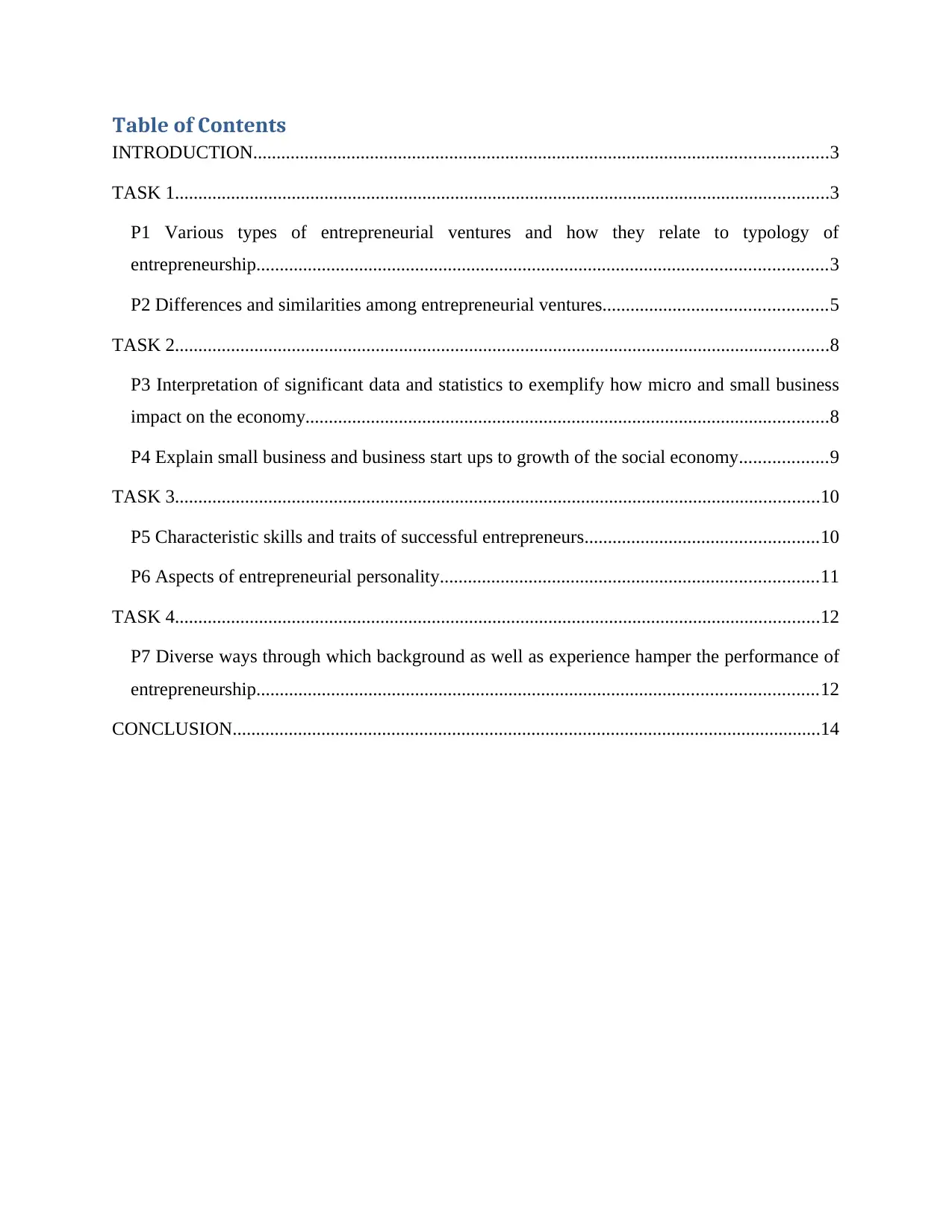
Table of Contents
INTRODUCTION...........................................................................................................................3
TASK 1............................................................................................................................................3
P1 Various types of entrepreneurial ventures and how they relate to typology of
entrepreneurship..........................................................................................................................3
P2 Differences and similarities among entrepreneurial ventures................................................5
TASK 2............................................................................................................................................8
P3 Interpretation of significant data and statistics to exemplify how micro and small business
impact on the economy................................................................................................................8
P4 Explain small business and business start ups to growth of the social economy...................9
TASK 3..........................................................................................................................................10
P5 Characteristic skills and traits of successful entrepreneurs..................................................10
P6 Aspects of entrepreneurial personality.................................................................................11
TASK 4..........................................................................................................................................12
P7 Diverse ways through which background as well as experience hamper the performance of
entrepreneurship........................................................................................................................12
CONCLUSION..............................................................................................................................14
INTRODUCTION...........................................................................................................................3
TASK 1............................................................................................................................................3
P1 Various types of entrepreneurial ventures and how they relate to typology of
entrepreneurship..........................................................................................................................3
P2 Differences and similarities among entrepreneurial ventures................................................5
TASK 2............................................................................................................................................8
P3 Interpretation of significant data and statistics to exemplify how micro and small business
impact on the economy................................................................................................................8
P4 Explain small business and business start ups to growth of the social economy...................9
TASK 3..........................................................................................................................................10
P5 Characteristic skills and traits of successful entrepreneurs..................................................10
P6 Aspects of entrepreneurial personality.................................................................................11
TASK 4..........................................................................................................................................12
P7 Diverse ways through which background as well as experience hamper the performance of
entrepreneurship........................................................................................................................12
CONCLUSION..............................................................................................................................14
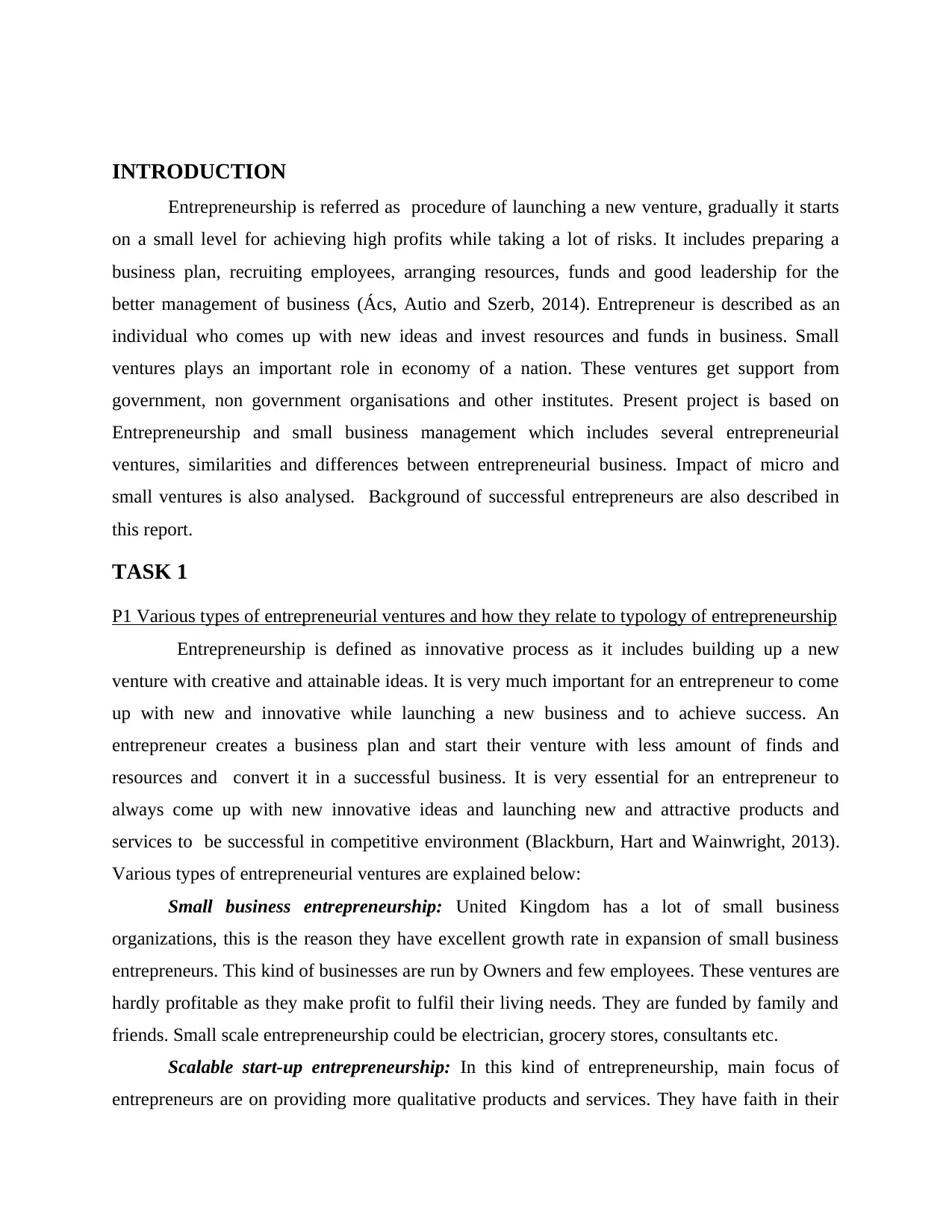
INTRODUCTION
Entrepreneurship is referred as procedure of launching a new venture, gradually it starts
on a small level for achieving high profits while taking a lot of risks. It includes preparing a
business plan, recruiting employees, arranging resources, funds and good leadership for the
better management of business (Ács, Autio and Szerb, 2014). Entrepreneur is described as an
individual who comes up with new ideas and invest resources and funds in business. Small
ventures plays an important role in economy of a nation. These ventures get support from
government, non government organisations and other institutes. Present project is based on
Entrepreneurship and small business management which includes several entrepreneurial
ventures, similarities and differences between entrepreneurial business. Impact of micro and
small ventures is also analysed. Background of successful entrepreneurs are also described in
this report.
TASK 1
P1 Various types of entrepreneurial ventures and how they relate to typology of entrepreneurship
Entrepreneurship is defined as innovative process as it includes building up a new
venture with creative and attainable ideas. It is very much important for an entrepreneur to come
up with new and innovative while launching a new business and to achieve success. An
entrepreneur creates a business plan and start their venture with less amount of finds and
resources and convert it in a successful business. It is very essential for an entrepreneur to
always come up with new innovative ideas and launching new and attractive products and
services to be successful in competitive environment (Blackburn, Hart and Wainwright, 2013).
Various types of entrepreneurial ventures are explained below:
Small business entrepreneurship: United Kingdom has a lot of small business
organizations, this is the reason they have excellent growth rate in expansion of small business
entrepreneurs. This kind of businesses are run by Owners and few employees. These ventures are
hardly profitable as they make profit to fulfil their living needs. They are funded by family and
friends. Small scale entrepreneurship could be electrician, grocery stores, consultants etc.
Scalable start-up entrepreneurship: In this kind of entrepreneurship, main focus of
entrepreneurs are on providing more qualitative products and services. They have faith in their
Entrepreneurship is referred as procedure of launching a new venture, gradually it starts
on a small level for achieving high profits while taking a lot of risks. It includes preparing a
business plan, recruiting employees, arranging resources, funds and good leadership for the
better management of business (Ács, Autio and Szerb, 2014). Entrepreneur is described as an
individual who comes up with new ideas and invest resources and funds in business. Small
ventures plays an important role in economy of a nation. These ventures get support from
government, non government organisations and other institutes. Present project is based on
Entrepreneurship and small business management which includes several entrepreneurial
ventures, similarities and differences between entrepreneurial business. Impact of micro and
small ventures is also analysed. Background of successful entrepreneurs are also described in
this report.
TASK 1
P1 Various types of entrepreneurial ventures and how they relate to typology of entrepreneurship
Entrepreneurship is defined as innovative process as it includes building up a new
venture with creative and attainable ideas. It is very much important for an entrepreneur to come
up with new and innovative while launching a new business and to achieve success. An
entrepreneur creates a business plan and start their venture with less amount of finds and
resources and convert it in a successful business. It is very essential for an entrepreneur to
always come up with new innovative ideas and launching new and attractive products and
services to be successful in competitive environment (Blackburn, Hart and Wainwright, 2013).
Various types of entrepreneurial ventures are explained below:
Small business entrepreneurship: United Kingdom has a lot of small business
organizations, this is the reason they have excellent growth rate in expansion of small business
entrepreneurs. This kind of businesses are run by Owners and few employees. These ventures are
hardly profitable as they make profit to fulfil their living needs. They are funded by family and
friends. Small scale entrepreneurship could be electrician, grocery stores, consultants etc.
Scalable start-up entrepreneurship: In this kind of entrepreneurship, main focus of
entrepreneurs are on providing more qualitative products and services. They have faith in their
⊘ This is a preview!⊘
Do you want full access?
Subscribe today to unlock all pages.

Trusted by 1+ million students worldwide
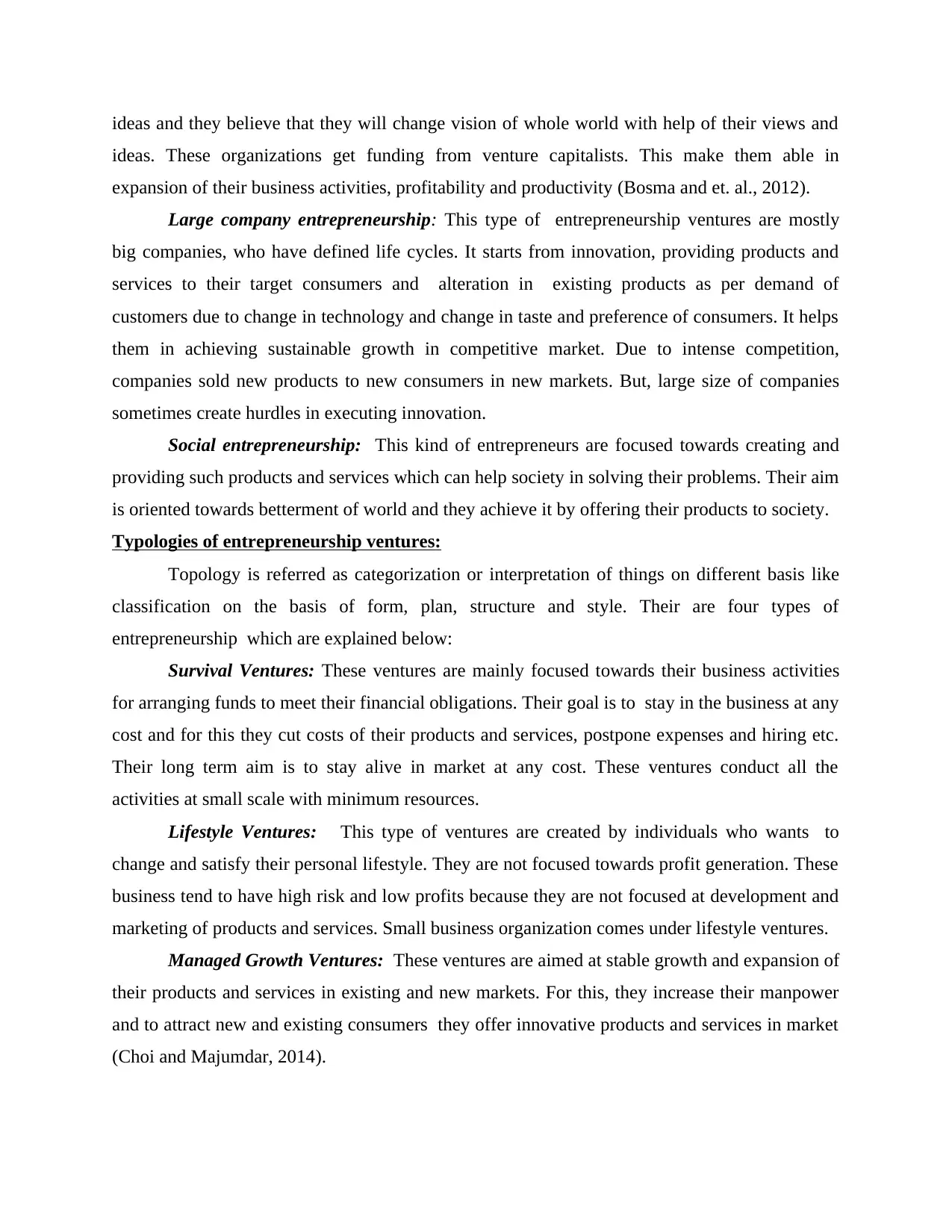
ideas and they believe that they will change vision of whole world with help of their views and
ideas. These organizations get funding from venture capitalists. This make them able in
expansion of their business activities, profitability and productivity (Bosma and et. al., 2012).
Large company entrepreneurship: This type of entrepreneurship ventures are mostly
big companies, who have defined life cycles. It starts from innovation, providing products and
services to their target consumers and alteration in existing products as per demand of
customers due to change in technology and change in taste and preference of consumers. It helps
them in achieving sustainable growth in competitive market. Due to intense competition,
companies sold new products to new consumers in new markets. But, large size of companies
sometimes create hurdles in executing innovation.
Social entrepreneurship: This kind of entrepreneurs are focused towards creating and
providing such products and services which can help society in solving their problems. Their aim
is oriented towards betterment of world and they achieve it by offering their products to society.
Typologies of entrepreneurship ventures:
Topology is referred as categorization or interpretation of things on different basis like
classification on the basis of form, plan, structure and style. Their are four types of
entrepreneurship which are explained below:
Survival Ventures: These ventures are mainly focused towards their business activities
for arranging funds to meet their financial obligations. Their goal is to stay in the business at any
cost and for this they cut costs of their products and services, postpone expenses and hiring etc.
Their long term aim is to stay alive in market at any cost. These ventures conduct all the
activities at small scale with minimum resources.
Lifestyle Ventures: This type of ventures are created by individuals who wants to
change and satisfy their personal lifestyle. They are not focused towards profit generation. These
business tend to have high risk and low profits because they are not focused at development and
marketing of products and services. Small business organization comes under lifestyle ventures.
Managed Growth Ventures: These ventures are aimed at stable growth and expansion of
their products and services in existing and new markets. For this, they increase their manpower
and to attract new and existing consumers they offer innovative products and services in market
(Choi and Majumdar, 2014).
ideas. These organizations get funding from venture capitalists. This make them able in
expansion of their business activities, profitability and productivity (Bosma and et. al., 2012).
Large company entrepreneurship: This type of entrepreneurship ventures are mostly
big companies, who have defined life cycles. It starts from innovation, providing products and
services to their target consumers and alteration in existing products as per demand of
customers due to change in technology and change in taste and preference of consumers. It helps
them in achieving sustainable growth in competitive market. Due to intense competition,
companies sold new products to new consumers in new markets. But, large size of companies
sometimes create hurdles in executing innovation.
Social entrepreneurship: This kind of entrepreneurs are focused towards creating and
providing such products and services which can help society in solving their problems. Their aim
is oriented towards betterment of world and they achieve it by offering their products to society.
Typologies of entrepreneurship ventures:
Topology is referred as categorization or interpretation of things on different basis like
classification on the basis of form, plan, structure and style. Their are four types of
entrepreneurship which are explained below:
Survival Ventures: These ventures are mainly focused towards their business activities
for arranging funds to meet their financial obligations. Their goal is to stay in the business at any
cost and for this they cut costs of their products and services, postpone expenses and hiring etc.
Their long term aim is to stay alive in market at any cost. These ventures conduct all the
activities at small scale with minimum resources.
Lifestyle Ventures: This type of ventures are created by individuals who wants to
change and satisfy their personal lifestyle. They are not focused towards profit generation. These
business tend to have high risk and low profits because they are not focused at development and
marketing of products and services. Small business organization comes under lifestyle ventures.
Managed Growth Ventures: These ventures are aimed at stable growth and expansion of
their products and services in existing and new markets. For this, they increase their manpower
and to attract new and existing consumers they offer innovative products and services in market
(Choi and Majumdar, 2014).
Paraphrase This Document
Need a fresh take? Get an instant paraphrase of this document with our AI Paraphraser
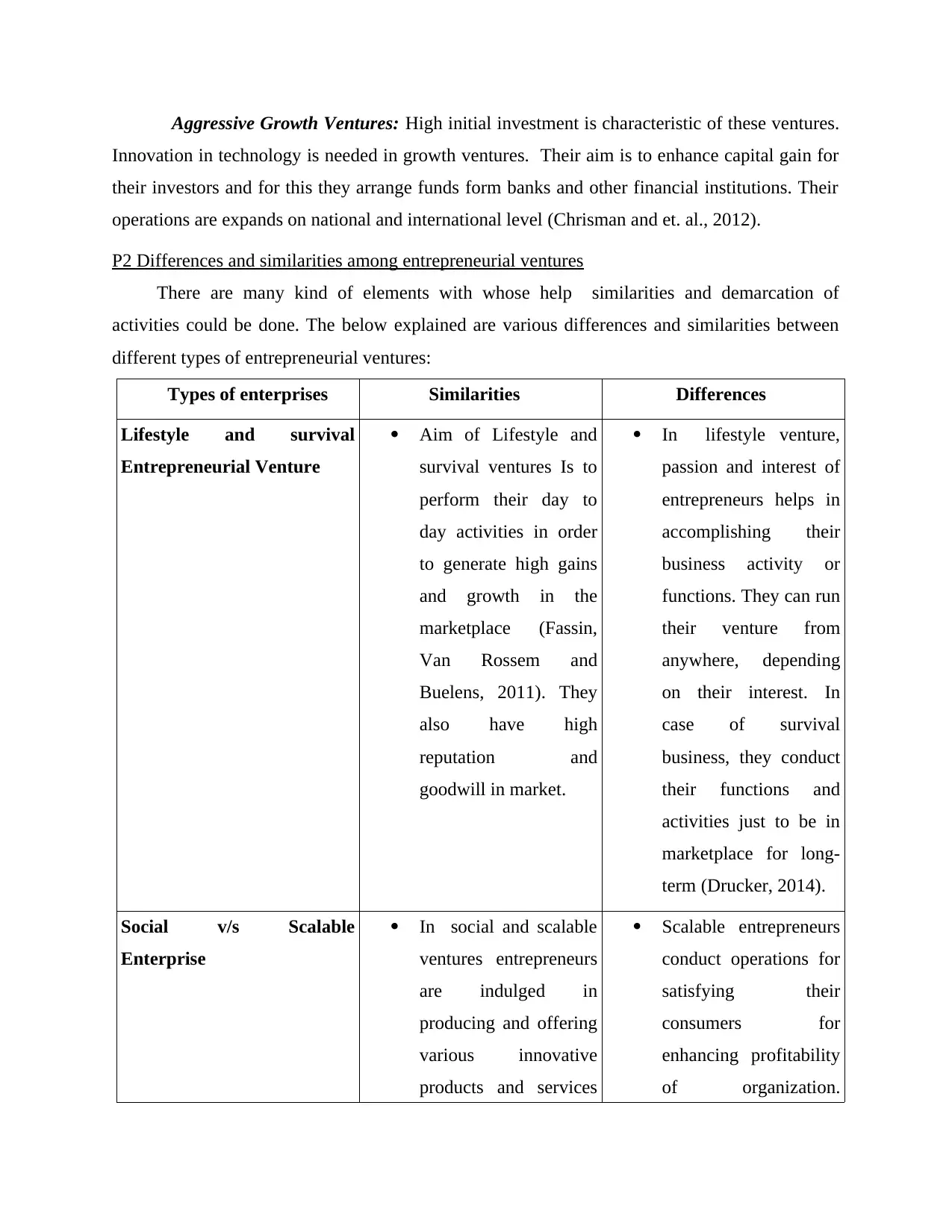
Aggressive Growth Ventures: High initial investment is characteristic of these ventures.
Innovation in technology is needed in growth ventures. Their aim is to enhance capital gain for
their investors and for this they arrange funds form banks and other financial institutions. Their
operations are expands on national and international level (Chrisman and et. al., 2012).
P2 Differences and similarities among entrepreneurial ventures
There are many kind of elements with whose help similarities and demarcation of
activities could be done. The below explained are various differences and similarities between
different types of entrepreneurial ventures:
Types of enterprises Similarities Differences
Lifestyle and survival
Entrepreneurial Venture
Aim of Lifestyle and
survival ventures Is to
perform their day to
day activities in order
to generate high gains
and growth in the
marketplace (Fassin,
Van Rossem and
Buelens, 2011). They
also have high
reputation and
goodwill in market.
In lifestyle venture,
passion and interest of
entrepreneurs helps in
accomplishing their
business activity or
functions. They can run
their venture from
anywhere, depending
on their interest. In
case of survival
business, they conduct
their functions and
activities just to be in
marketplace for long-
term (Drucker, 2014).
Social v/s Scalable
Enterprise
In social and scalable
ventures entrepreneurs
are indulged in
producing and offering
various innovative
products and services
Scalable entrepreneurs
conduct operations for
satisfying their
consumers for
enhancing profitability
of organization.
Innovation in technology is needed in growth ventures. Their aim is to enhance capital gain for
their investors and for this they arrange funds form banks and other financial institutions. Their
operations are expands on national and international level (Chrisman and et. al., 2012).
P2 Differences and similarities among entrepreneurial ventures
There are many kind of elements with whose help similarities and demarcation of
activities could be done. The below explained are various differences and similarities between
different types of entrepreneurial ventures:
Types of enterprises Similarities Differences
Lifestyle and survival
Entrepreneurial Venture
Aim of Lifestyle and
survival ventures Is to
perform their day to
day activities in order
to generate high gains
and growth in the
marketplace (Fassin,
Van Rossem and
Buelens, 2011). They
also have high
reputation and
goodwill in market.
In lifestyle venture,
passion and interest of
entrepreneurs helps in
accomplishing their
business activity or
functions. They can run
their venture from
anywhere, depending
on their interest. In
case of survival
business, they conduct
their functions and
activities just to be in
marketplace for long-
term (Drucker, 2014).
Social v/s Scalable
Enterprise
In social and scalable
ventures entrepreneurs
are indulged in
producing and offering
various innovative
products and services
Scalable entrepreneurs
conduct operations for
satisfying their
consumers for
enhancing profitability
of organization.
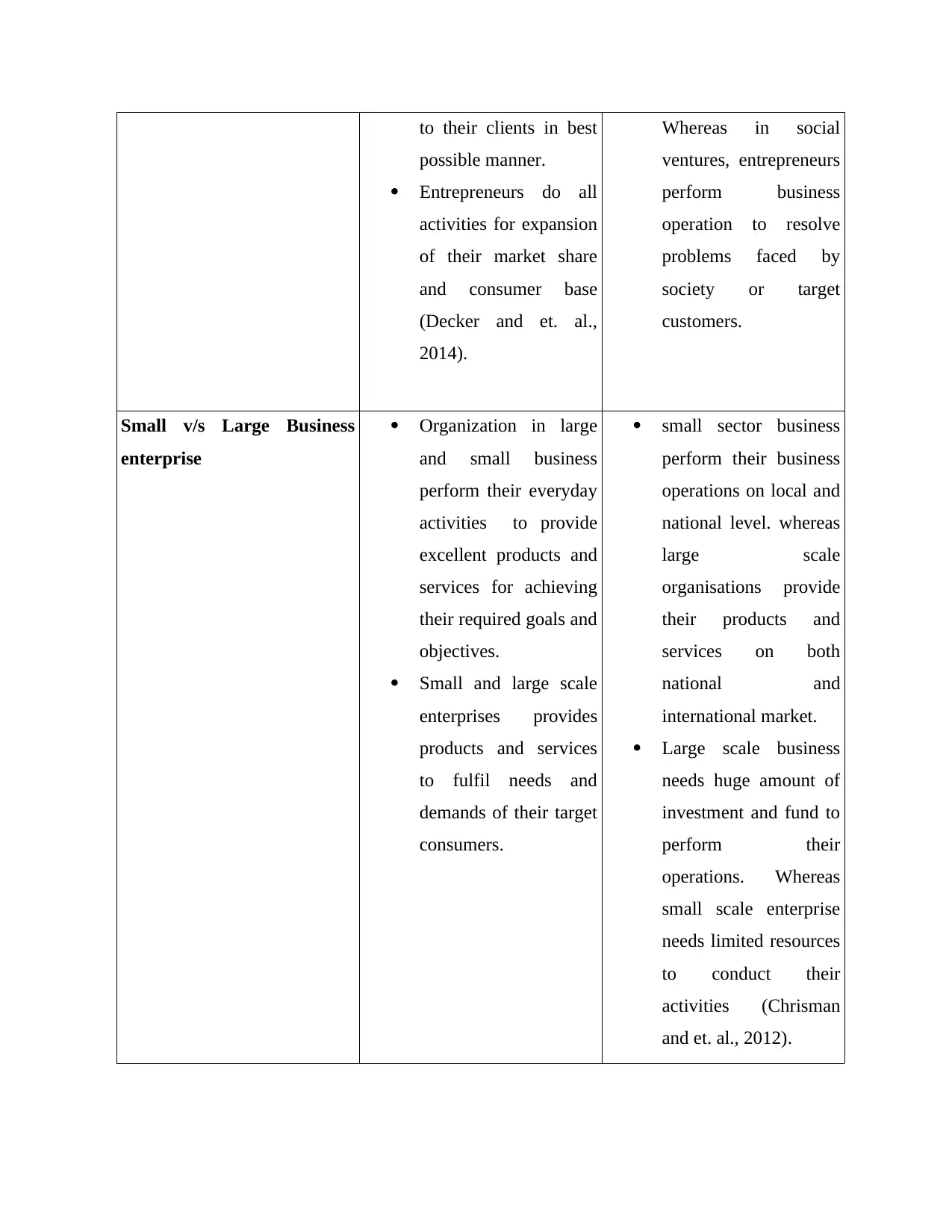
to their clients in best
possible manner.
Entrepreneurs do all
activities for expansion
of their market share
and consumer base
(Decker and et. al.,
2014).
Whereas in social
ventures, entrepreneurs
perform business
operation to resolve
problems faced by
society or target
customers.
Small v/s Large Business
enterprise
Organization in large
and small business
perform their everyday
activities to provide
excellent products and
services for achieving
their required goals and
objectives.
Small and large scale
enterprises provides
products and services
to fulfil needs and
demands of their target
consumers.
small sector business
perform their business
operations on local and
national level. whereas
large scale
organisations provide
their products and
services on both
national and
international market.
Large scale business
needs huge amount of
investment and fund to
perform their
operations. Whereas
small scale enterprise
needs limited resources
to conduct their
activities (Chrisman
and et. al., 2012).
possible manner.
Entrepreneurs do all
activities for expansion
of their market share
and consumer base
(Decker and et. al.,
2014).
Whereas in social
ventures, entrepreneurs
perform business
operation to resolve
problems faced by
society or target
customers.
Small v/s Large Business
enterprise
Organization in large
and small business
perform their everyday
activities to provide
excellent products and
services for achieving
their required goals and
objectives.
Small and large scale
enterprises provides
products and services
to fulfil needs and
demands of their target
consumers.
small sector business
perform their business
operations on local and
national level. whereas
large scale
organisations provide
their products and
services on both
national and
international market.
Large scale business
needs huge amount of
investment and fund to
perform their
operations. Whereas
small scale enterprise
needs limited resources
to conduct their
activities (Chrisman
and et. al., 2012).
⊘ This is a preview!⊘
Do you want full access?
Subscribe today to unlock all pages.

Trusted by 1+ million students worldwide

TASK 2
P3 Interpretation of significant data and statistics to exemplify how micro and small business
impact on the economy
It can be said that small and micro organisations are considered as one of the most crucial part
of an economy within country. By this they can enhance their services within international
market (Decker and et. al., 2014). By this GDP of UK has been intensified by around 6.1%.
Apart from this, these types of organisation creates high rate of job opportunities.
Above mentioned graph is showing that, Brexit has created strong impact on market in
affirmative manner within market of UK. This will lead to growth of 88.2% and with respect to
GLLCP, they have expanded more than 0.6%. From this it can be concluded that economy of
country has both affirmative as well as pessimistic impact. They are mentioned below:
Share of business in United Kingdom: Within UK there are various large as well as small
business units which aid them in growing economy in effectual way. These sectors almost
provide around 1.4 million employment opportunities for international, national, local and state
people within UK. Furthermore, this will enable to acquire foreign currencies which will
enhance economy of country in appropriate and effectual manner (Drucker, 2014).
Illustration 1: Impact of Economy on UK, 2018
(Source: Impact of Economy on UK, 2018)
P3 Interpretation of significant data and statistics to exemplify how micro and small business
impact on the economy
It can be said that small and micro organisations are considered as one of the most crucial part
of an economy within country. By this they can enhance their services within international
market (Decker and et. al., 2014). By this GDP of UK has been intensified by around 6.1%.
Apart from this, these types of organisation creates high rate of job opportunities.
Above mentioned graph is showing that, Brexit has created strong impact on market in
affirmative manner within market of UK. This will lead to growth of 88.2% and with respect to
GLLCP, they have expanded more than 0.6%. From this it can be concluded that economy of
country has both affirmative as well as pessimistic impact. They are mentioned below:
Share of business in United Kingdom: Within UK there are various large as well as small
business units which aid them in growing economy in effectual way. These sectors almost
provide around 1.4 million employment opportunities for international, national, local and state
people within UK. Furthermore, this will enable to acquire foreign currencies which will
enhance economy of country in appropriate and effectual manner (Drucker, 2014).
Illustration 1: Impact of Economy on UK, 2018
(Source: Impact of Economy on UK, 2018)
Paraphrase This Document
Need a fresh take? Get an instant paraphrase of this document with our AI Paraphraser
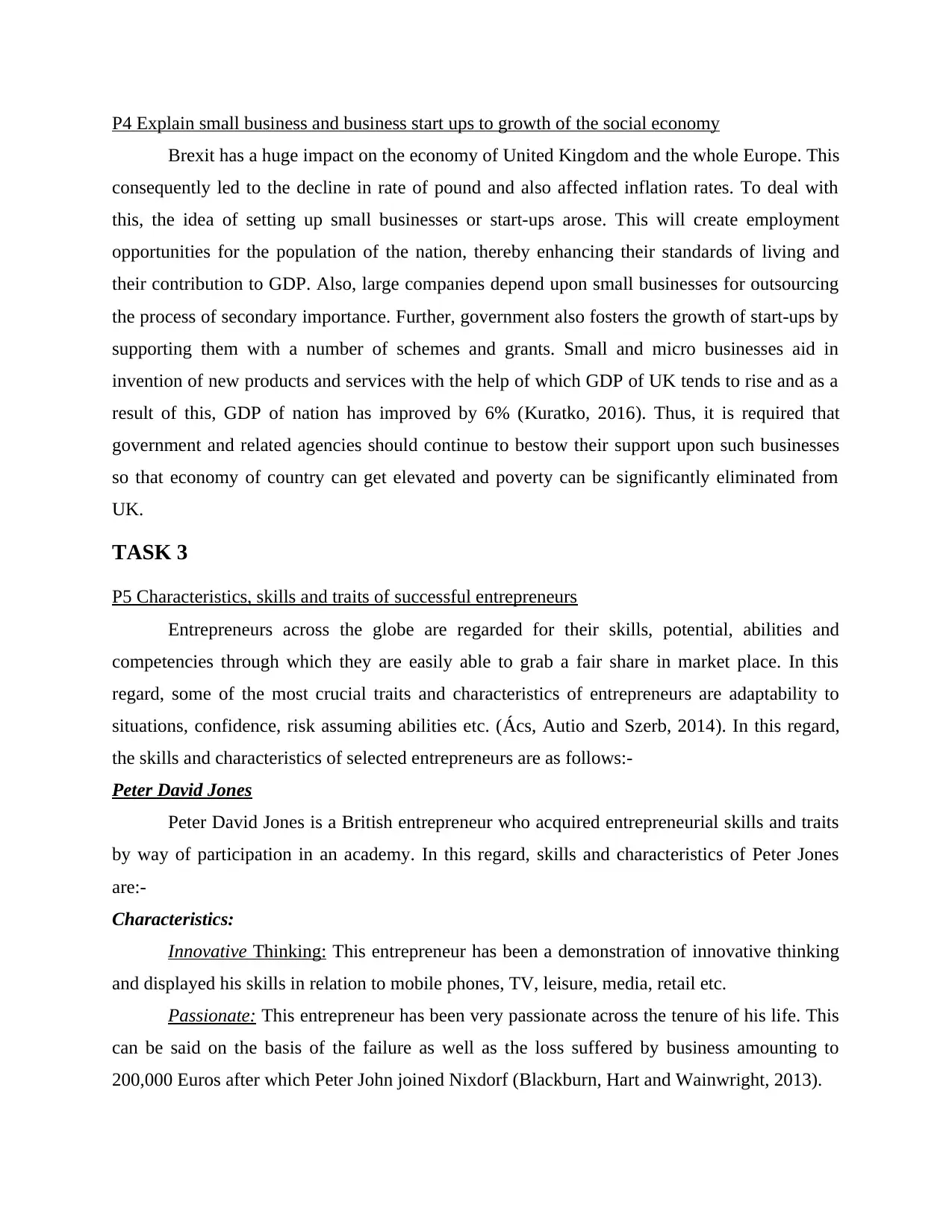
P4 Explain small business and business start ups to growth of the social economy
Brexit has a huge impact on the economy of United Kingdom and the whole Europe. This
consequently led to the decline in rate of pound and also affected inflation rates. To deal with
this, the idea of setting up small businesses or start-ups arose. This will create employment
opportunities for the population of the nation, thereby enhancing their standards of living and
their contribution to GDP. Also, large companies depend upon small businesses for outsourcing
the process of secondary importance. Further, government also fosters the growth of start-ups by
supporting them with a number of schemes and grants. Small and micro businesses aid in
invention of new products and services with the help of which GDP of UK tends to rise and as a
result of this, GDP of nation has improved by 6% (Kuratko, 2016). Thus, it is required that
government and related agencies should continue to bestow their support upon such businesses
so that economy of country can get elevated and poverty can be significantly eliminated from
UK.
TASK 3
P5 Characteristics, skills and traits of successful entrepreneurs
Entrepreneurs across the globe are regarded for their skills, potential, abilities and
competencies through which they are easily able to grab a fair share in market place. In this
regard, some of the most crucial traits and characteristics of entrepreneurs are adaptability to
situations, confidence, risk assuming abilities etc. (Ács, Autio and Szerb, 2014). In this regard,
the skills and characteristics of selected entrepreneurs are as follows:-
Peter David Jones
Peter David Jones is a British entrepreneur who acquired entrepreneurial skills and traits
by way of participation in an academy. In this regard, skills and characteristics of Peter Jones
are:-
Characteristics:
Innovative Thinking: This entrepreneur has been a demonstration of innovative thinking
and displayed his skills in relation to mobile phones, TV, leisure, media, retail etc.
Passionate: This entrepreneur has been very passionate across the tenure of his life. This
can be said on the basis of the failure as well as the loss suffered by business amounting to
200,000 Euros after which Peter John joined Nixdorf (Blackburn, Hart and Wainwright, 2013).
Brexit has a huge impact on the economy of United Kingdom and the whole Europe. This
consequently led to the decline in rate of pound and also affected inflation rates. To deal with
this, the idea of setting up small businesses or start-ups arose. This will create employment
opportunities for the population of the nation, thereby enhancing their standards of living and
their contribution to GDP. Also, large companies depend upon small businesses for outsourcing
the process of secondary importance. Further, government also fosters the growth of start-ups by
supporting them with a number of schemes and grants. Small and micro businesses aid in
invention of new products and services with the help of which GDP of UK tends to rise and as a
result of this, GDP of nation has improved by 6% (Kuratko, 2016). Thus, it is required that
government and related agencies should continue to bestow their support upon such businesses
so that economy of country can get elevated and poverty can be significantly eliminated from
UK.
TASK 3
P5 Characteristics, skills and traits of successful entrepreneurs
Entrepreneurs across the globe are regarded for their skills, potential, abilities and
competencies through which they are easily able to grab a fair share in market place. In this
regard, some of the most crucial traits and characteristics of entrepreneurs are adaptability to
situations, confidence, risk assuming abilities etc. (Ács, Autio and Szerb, 2014). In this regard,
the skills and characteristics of selected entrepreneurs are as follows:-
Peter David Jones
Peter David Jones is a British entrepreneur who acquired entrepreneurial skills and traits
by way of participation in an academy. In this regard, skills and characteristics of Peter Jones
are:-
Characteristics:
Innovative Thinking: This entrepreneur has been a demonstration of innovative thinking
and displayed his skills in relation to mobile phones, TV, leisure, media, retail etc.
Passionate: This entrepreneur has been very passionate across the tenure of his life. This
can be said on the basis of the failure as well as the loss suffered by business amounting to
200,000 Euros after which Peter John joined Nixdorf (Blackburn, Hart and Wainwright, 2013).
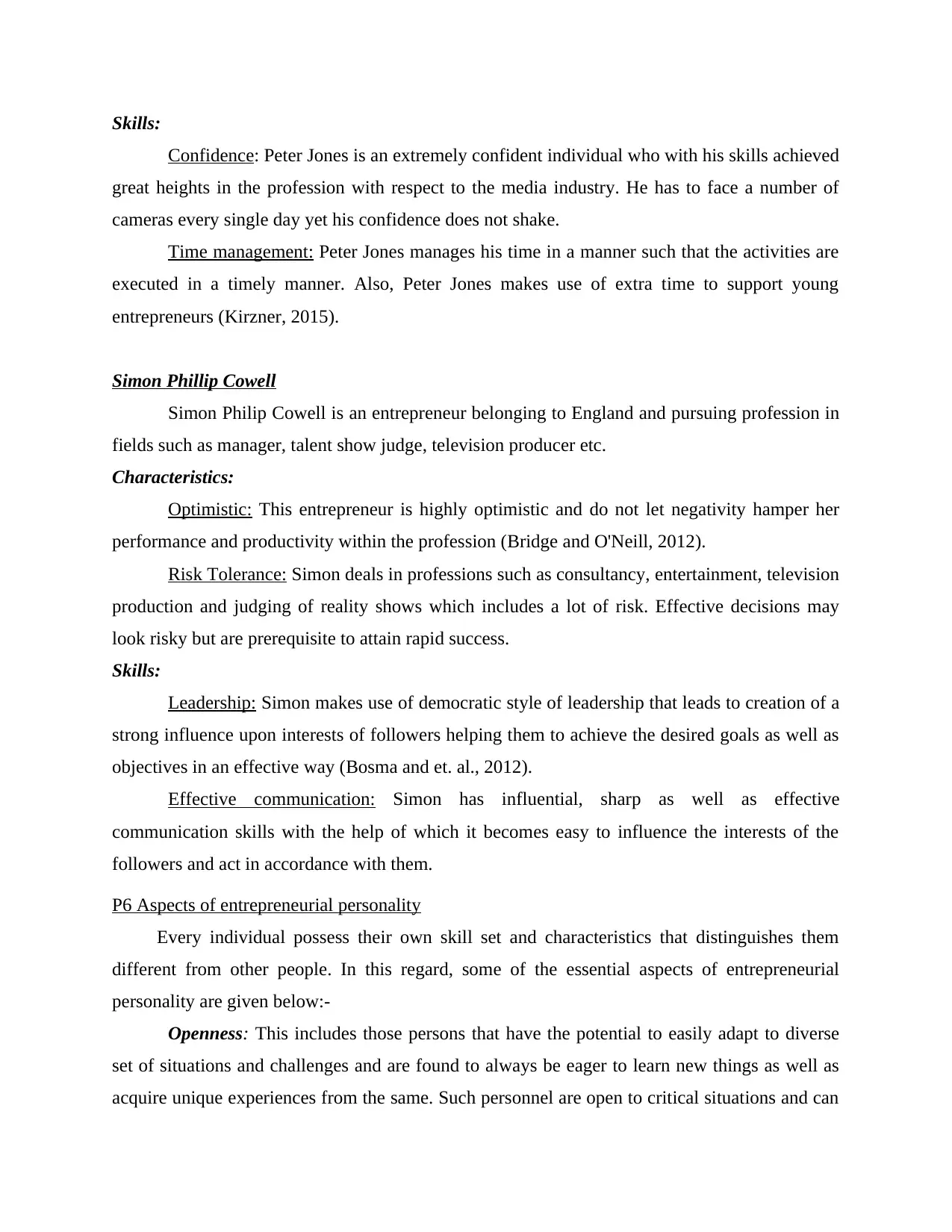
Skills:
Confidence: Peter Jones is an extremely confident individual who with his skills achieved
great heights in the profession with respect to the media industry. He has to face a number of
cameras every single day yet his confidence does not shake.
Time management: Peter Jones manages his time in a manner such that the activities are
executed in a timely manner. Also, Peter Jones makes use of extra time to support young
entrepreneurs (Kirzner, 2015).
Simon Phillip Cowell
Simon Philip Cowell is an entrepreneur belonging to England and pursuing profession in
fields such as manager, talent show judge, television producer etc.
Characteristics:
Optimistic: This entrepreneur is highly optimistic and do not let negativity hamper her
performance and productivity within the profession (Bridge and O'Neill, 2012).
Risk Tolerance: Simon deals in professions such as consultancy, entertainment, television
production and judging of reality shows which includes a lot of risk. Effective decisions may
look risky but are prerequisite to attain rapid success.
Skills:
Leadership: Simon makes use of democratic style of leadership that leads to creation of a
strong influence upon interests of followers helping them to achieve the desired goals as well as
objectives in an effective way (Bosma and et. al., 2012).
Effective communication: Simon has influential, sharp as well as effective
communication skills with the help of which it becomes easy to influence the interests of the
followers and act in accordance with them.
P6 Aspects of entrepreneurial personality
Every individual possess their own skill set and characteristics that distinguishes them
different from other people. In this regard, some of the essential aspects of entrepreneurial
personality are given below:-
Openness: This includes those persons that have the potential to easily adapt to diverse
set of situations and challenges and are found to always be eager to learn new things as well as
acquire unique experiences from the same. Such personnel are open to critical situations and can
Confidence: Peter Jones is an extremely confident individual who with his skills achieved
great heights in the profession with respect to the media industry. He has to face a number of
cameras every single day yet his confidence does not shake.
Time management: Peter Jones manages his time in a manner such that the activities are
executed in a timely manner. Also, Peter Jones makes use of extra time to support young
entrepreneurs (Kirzner, 2015).
Simon Phillip Cowell
Simon Philip Cowell is an entrepreneur belonging to England and pursuing profession in
fields such as manager, talent show judge, television producer etc.
Characteristics:
Optimistic: This entrepreneur is highly optimistic and do not let negativity hamper her
performance and productivity within the profession (Bridge and O'Neill, 2012).
Risk Tolerance: Simon deals in professions such as consultancy, entertainment, television
production and judging of reality shows which includes a lot of risk. Effective decisions may
look risky but are prerequisite to attain rapid success.
Skills:
Leadership: Simon makes use of democratic style of leadership that leads to creation of a
strong influence upon interests of followers helping them to achieve the desired goals as well as
objectives in an effective way (Bosma and et. al., 2012).
Effective communication: Simon has influential, sharp as well as effective
communication skills with the help of which it becomes easy to influence the interests of the
followers and act in accordance with them.
P6 Aspects of entrepreneurial personality
Every individual possess their own skill set and characteristics that distinguishes them
different from other people. In this regard, some of the essential aspects of entrepreneurial
personality are given below:-
Openness: This includes those persons that have the potential to easily adapt to diverse
set of situations and challenges and are found to always be eager to learn new things as well as
acquire unique experiences from the same. Such personnel are open to critical situations and can
⊘ This is a preview!⊘
Do you want full access?
Subscribe today to unlock all pages.

Trusted by 1+ million students worldwide
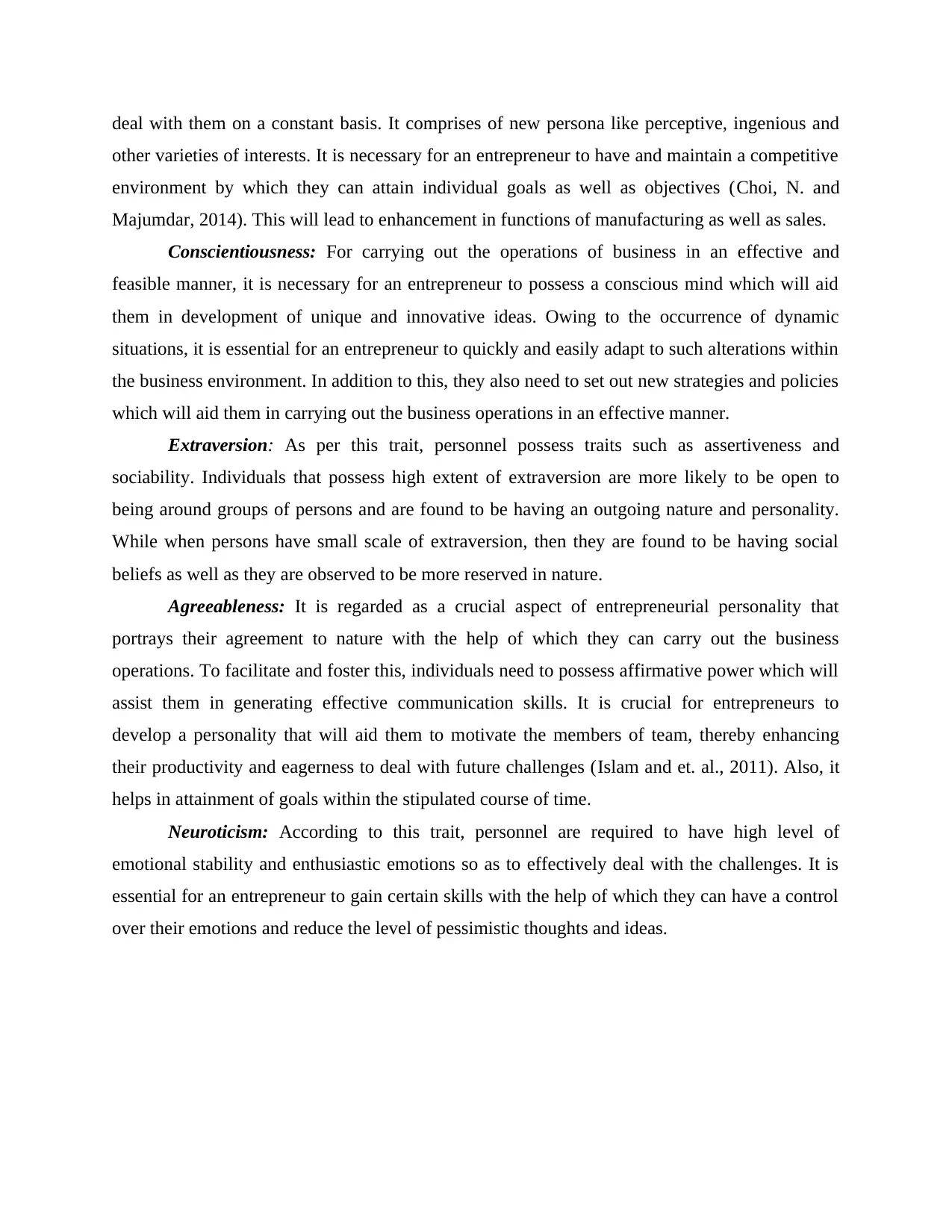
deal with them on a constant basis. It comprises of new persona like perceptive, ingenious and
other varieties of interests. It is necessary for an entrepreneur to have and maintain a competitive
environment by which they can attain individual goals as well as objectives (Choi, N. and
Majumdar, 2014). This will lead to enhancement in functions of manufacturing as well as sales.
Conscientiousness: For carrying out the operations of business in an effective and
feasible manner, it is necessary for an entrepreneur to possess a conscious mind which will aid
them in development of unique and innovative ideas. Owing to the occurrence of dynamic
situations, it is essential for an entrepreneur to quickly and easily adapt to such alterations within
the business environment. In addition to this, they also need to set out new strategies and policies
which will aid them in carrying out the business operations in an effective manner.
Extraversion: As per this trait, personnel possess traits such as assertiveness and
sociability. Individuals that possess high extent of extraversion are more likely to be open to
being around groups of persons and are found to be having an outgoing nature and personality.
While when persons have small scale of extraversion, then they are found to be having social
beliefs as well as they are observed to be more reserved in nature.
Agreeableness: It is regarded as a crucial aspect of entrepreneurial personality that
portrays their agreement to nature with the help of which they can carry out the business
operations. To facilitate and foster this, individuals need to possess affirmative power which will
assist them in generating effective communication skills. It is crucial for entrepreneurs to
develop a personality that will aid them to motivate the members of team, thereby enhancing
their productivity and eagerness to deal with future challenges (Islam and et. al., 2011). Also, it
helps in attainment of goals within the stipulated course of time.
Neuroticism: According to this trait, personnel are required to have high level of
emotional stability and enthusiastic emotions so as to effectively deal with the challenges. It is
essential for an entrepreneur to gain certain skills with the help of which they can have a control
over their emotions and reduce the level of pessimistic thoughts and ideas.
other varieties of interests. It is necessary for an entrepreneur to have and maintain a competitive
environment by which they can attain individual goals as well as objectives (Choi, N. and
Majumdar, 2014). This will lead to enhancement in functions of manufacturing as well as sales.
Conscientiousness: For carrying out the operations of business in an effective and
feasible manner, it is necessary for an entrepreneur to possess a conscious mind which will aid
them in development of unique and innovative ideas. Owing to the occurrence of dynamic
situations, it is essential for an entrepreneur to quickly and easily adapt to such alterations within
the business environment. In addition to this, they also need to set out new strategies and policies
which will aid them in carrying out the business operations in an effective manner.
Extraversion: As per this trait, personnel possess traits such as assertiveness and
sociability. Individuals that possess high extent of extraversion are more likely to be open to
being around groups of persons and are found to be having an outgoing nature and personality.
While when persons have small scale of extraversion, then they are found to be having social
beliefs as well as they are observed to be more reserved in nature.
Agreeableness: It is regarded as a crucial aspect of entrepreneurial personality that
portrays their agreement to nature with the help of which they can carry out the business
operations. To facilitate and foster this, individuals need to possess affirmative power which will
assist them in generating effective communication skills. It is crucial for entrepreneurs to
develop a personality that will aid them to motivate the members of team, thereby enhancing
their productivity and eagerness to deal with future challenges (Islam and et. al., 2011). Also, it
helps in attainment of goals within the stipulated course of time.
Neuroticism: According to this trait, personnel are required to have high level of
emotional stability and enthusiastic emotions so as to effectively deal with the challenges. It is
essential for an entrepreneur to gain certain skills with the help of which they can have a control
over their emotions and reduce the level of pessimistic thoughts and ideas.
Paraphrase This Document
Need a fresh take? Get an instant paraphrase of this document with our AI Paraphraser
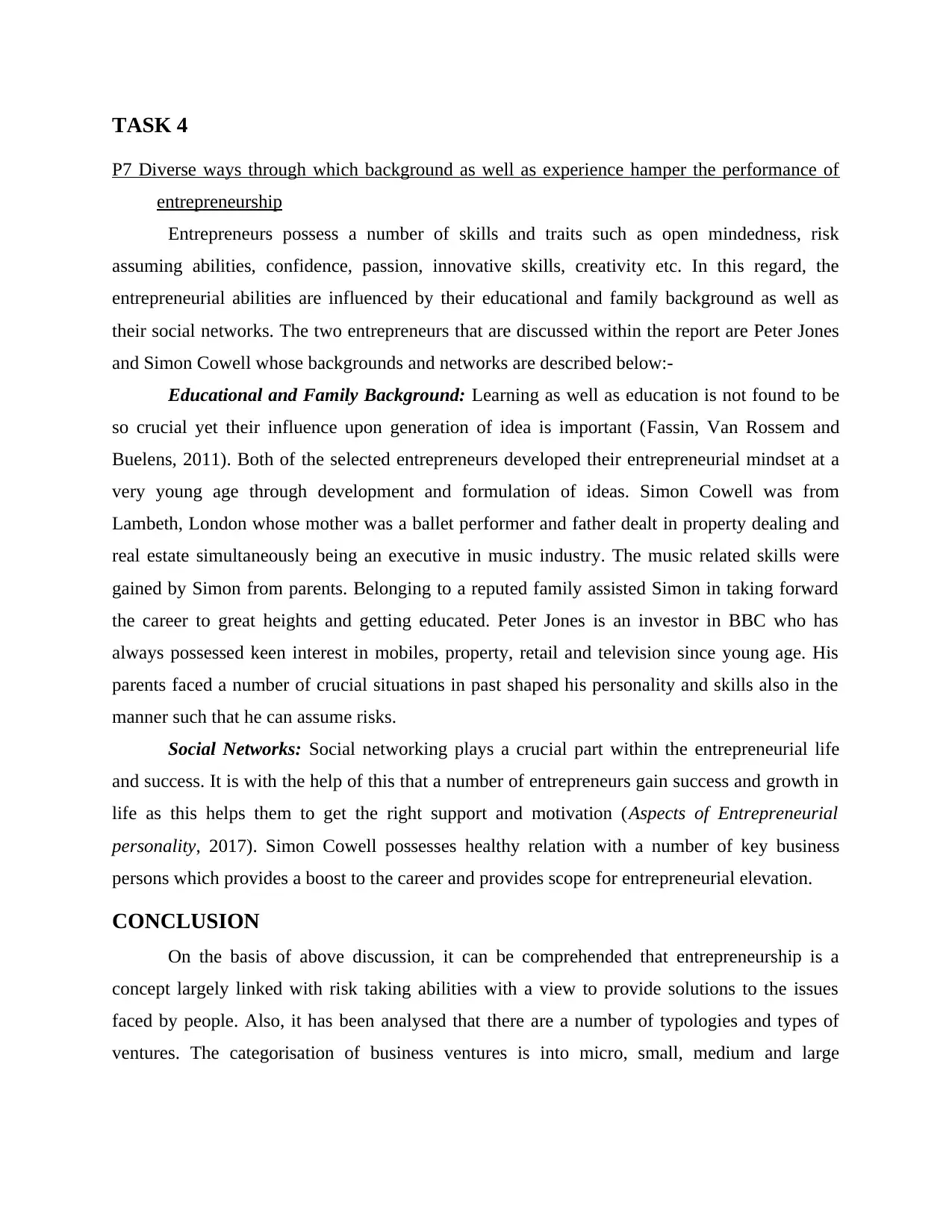
TASK 4
P7 Diverse ways through which background as well as experience hamper the performance of
entrepreneurship
Entrepreneurs possess a number of skills and traits such as open mindedness, risk
assuming abilities, confidence, passion, innovative skills, creativity etc. In this regard, the
entrepreneurial abilities are influenced by their educational and family background as well as
their social networks. The two entrepreneurs that are discussed within the report are Peter Jones
and Simon Cowell whose backgrounds and networks are described below:-
Educational and Family Background: Learning as well as education is not found to be
so crucial yet their influence upon generation of idea is important (Fassin, Van Rossem and
Buelens, 2011). Both of the selected entrepreneurs developed their entrepreneurial mindset at a
very young age through development and formulation of ideas. Simon Cowell was from
Lambeth, London whose mother was a ballet performer and father dealt in property dealing and
real estate simultaneously being an executive in music industry. The music related skills were
gained by Simon from parents. Belonging to a reputed family assisted Simon in taking forward
the career to great heights and getting educated. Peter Jones is an investor in BBC who has
always possessed keen interest in mobiles, property, retail and television since young age. His
parents faced a number of crucial situations in past shaped his personality and skills also in the
manner such that he can assume risks.
Social Networks: Social networking plays a crucial part within the entrepreneurial life
and success. It is with the help of this that a number of entrepreneurs gain success and growth in
life as this helps them to get the right support and motivation (Aspects of Entrepreneurial
personality, 2017). Simon Cowell possesses healthy relation with a number of key business
persons which provides a boost to the career and provides scope for entrepreneurial elevation.
CONCLUSION
On the basis of above discussion, it can be comprehended that entrepreneurship is a
concept largely linked with risk taking abilities with a view to provide solutions to the issues
faced by people. Also, it has been analysed that there are a number of typologies and types of
ventures. The categorisation of business ventures is into micro, small, medium and large
P7 Diverse ways through which background as well as experience hamper the performance of
entrepreneurship
Entrepreneurs possess a number of skills and traits such as open mindedness, risk
assuming abilities, confidence, passion, innovative skills, creativity etc. In this regard, the
entrepreneurial abilities are influenced by their educational and family background as well as
their social networks. The two entrepreneurs that are discussed within the report are Peter Jones
and Simon Cowell whose backgrounds and networks are described below:-
Educational and Family Background: Learning as well as education is not found to be
so crucial yet their influence upon generation of idea is important (Fassin, Van Rossem and
Buelens, 2011). Both of the selected entrepreneurs developed their entrepreneurial mindset at a
very young age through development and formulation of ideas. Simon Cowell was from
Lambeth, London whose mother was a ballet performer and father dealt in property dealing and
real estate simultaneously being an executive in music industry. The music related skills were
gained by Simon from parents. Belonging to a reputed family assisted Simon in taking forward
the career to great heights and getting educated. Peter Jones is an investor in BBC who has
always possessed keen interest in mobiles, property, retail and television since young age. His
parents faced a number of crucial situations in past shaped his personality and skills also in the
manner such that he can assume risks.
Social Networks: Social networking plays a crucial part within the entrepreneurial life
and success. It is with the help of this that a number of entrepreneurs gain success and growth in
life as this helps them to get the right support and motivation (Aspects of Entrepreneurial
personality, 2017). Simon Cowell possesses healthy relation with a number of key business
persons which provides a boost to the career and provides scope for entrepreneurial elevation.
CONCLUSION
On the basis of above discussion, it can be comprehended that entrepreneurship is a
concept largely linked with risk taking abilities with a view to provide solutions to the issues
faced by people. Also, it has been analysed that there are a number of typologies and types of
ventures. The categorisation of business ventures is into micro, small, medium and large

enterprises out of which the most appropriate has to be selected by an entrepreneur. This helps
them to increase their share in market place and fosters growth of economy.
them to increase their share in market place and fosters growth of economy.
⊘ This is a preview!⊘
Do you want full access?
Subscribe today to unlock all pages.

Trusted by 1+ million students worldwide
1 out of 13
Related Documents
Your All-in-One AI-Powered Toolkit for Academic Success.
+13062052269
info@desklib.com
Available 24*7 on WhatsApp / Email
![[object Object]](/_next/static/media/star-bottom.7253800d.svg)
Unlock your academic potential
Copyright © 2020–2026 A2Z Services. All Rights Reserved. Developed and managed by ZUCOL.





